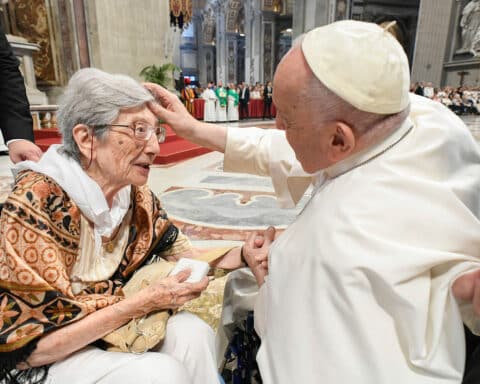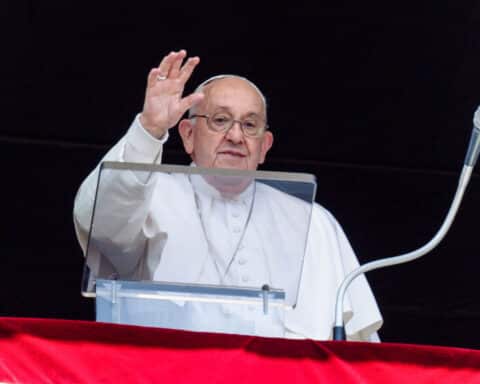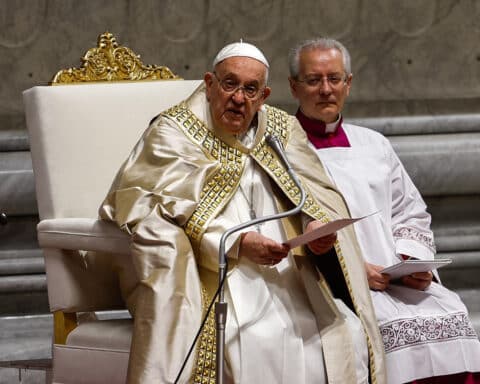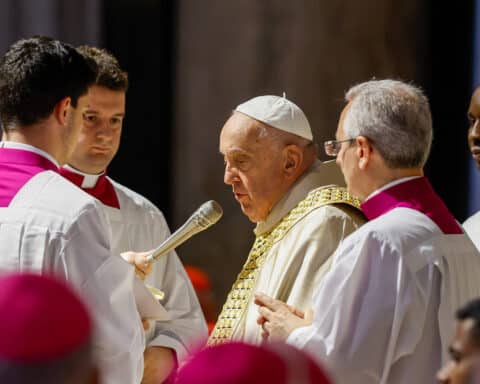VATICAN CITY (CNS) — After Pope Francis told young Russian Catholics they were heirs of “the great, educated Russian Empire,” Ukraine’s bishops told him that some of his statements were “painful and difficult for the Ukrainian people” and are used by Russia to justify its invasion of Ukraine.
“Misunderstandings that have arisen between Ukraine and the Vatican since the beginning of the full-scale war, the bishops explained, are used by Russian propaganda to justify and support the murderous ideology of the ‘Russian World,'” said a statement released by the Ukrainian bishops Sept. 6 after their two-hour meeting with the pope at the Vatican.
“Russian World” or “Russkii Mir” refers to the cultural and political sphere of Russian influence beyond its borders and is a vision Russian President Vladimir Putin has invoked in his invasion of Ukraine.
Although the meeting of the Eastern-rite Ukrainian Catholic bishops’ synod originally was scheduled to last an hour, the statement noted that it was extended at the pope’s request.
“He didn’t spend the time talking at us. He spent the time listening to us and being with us,” Bishop Kenneth Nowakowski of the Ukrainian Catholic Diocese of the Holy Family in London told Catholic News Service. “The bishops were free, and they brought up all of the feelings of hurt that their people have. It was an important thing for us that the Holy Father listened to that, that he heard how the people reacted” when he told the Russian young people in late August to be proud of their heritage.
Pope’s remarks
Pope Francis told the bishops that he had explained his remarks to reporters Sept. 4 on his return flight to Rome from Mongolia, admitting that his reference to Peter the Great and Catherine II — who invaded and conquered neighboring nations — was not the best way to make his point about having a culture of great art, music and literature.
He also told the Ukrainian bishops that he had explained to reporters his understanding of the “pain” that occurs when a nation’s cultural heritage is “distilled and manipulated by a certain state power, and as a result turns into an ideology that destroys and kills,” the statement said.
“The fact that you doubted whom the pope is with was particularly painful for the Ukrainian people,” he told the bishops. “I want to assure you of my solidarity with you and constant prayerful closeness. I am with the Ukrainian people.”
As a sign of that closeness, Pope Francis brought with him a Marian icon given to him by Archbishop Shevchuk when the Ukrainian was a young bishop in Argentina. “I pray for Ukraine every day in front of her,” he told the bishops.
A Vatican statement released after the meeting said the pope also expressed his desire that the rosary be prayed for peace in Ukraine throughout the month of October, especially in Marian shrines.
Bishops meeting in Rome
The bishops thanked the pope for the humanitarian support he has provided to Ukraine — papal almoner Cardinal Konrad Krajewski has repeatedly taken clothes, medicine and other humanitarian supplies to Ukraine on the pope’s behalf — his efforts to free prisoners of war and the peace mission he entrusted to his special envoy Cardinal Matteo Zuppi, archbishop of Bologna, who has traveled to Kyiv, Moscow and Washington to meet with government and church officials.
They also asked Pope Francis to continue working for the release of two Redemptorist priests who have been held in Russian captivity since November 2022. They gave the pope some of the priests’ personal belongings as gifts, including a missionary cross, prayer book and rosary.
Forty-five of the 56 Ukrainian Catholic bishops from around the world were holding their synod meeting in Rome. During the two-hour meeting, 15 or 16 of them spoke to the pope “about what they felt, their pain, the situation of the war” and what their people are living through, Bishop Nowakowski said. “It was an amazing sign of solidarity with us.”
After their meeting with the pope, the bishops also met with Cardinal-designate Claudio Gugerotti, prefect of the Dicastery for the Eastern Churches. The previous day, they met with Cardinals Pietro Parolin, Vatican secretary of state, and Kurt Koch, Prefect of the Dicastery for Promoting Christian Unity.
Cardinal Parolin told them that the pope’s public statements on Ukraine make it “unjust to doubt his affection for the Ukrainian people and his efforts, not always understood and appreciated, to help end the ongoing tragedy and secure a just and stable peace through negotiation,” according to a statement Archbishop Shevchuk’s Rome office.
The cardinal also welcomed Archbishop Shevchuk’s suggestion for a meeting of the Permanent Interdicasterial Commission for the Church in Eastern Europe, formed after the dissolution of the Pontifical Commission for Russia decreed by St. John Paul II in 1993, to discuss issues related to the war in Ukraine such as the concept of the Russian World, “which serves as an ideological platform for the Russian invasion.”
Contributing to this story was Cindy Wooden in Rome.





